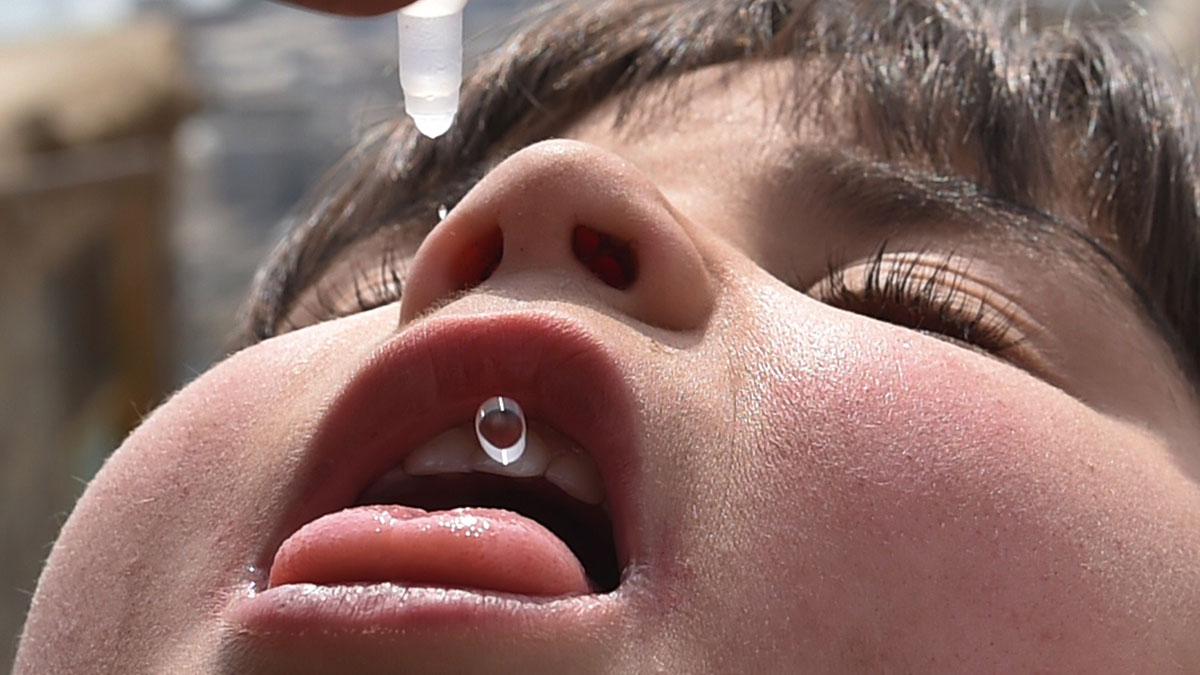Polio in Ukraine: what the outbreak means
Two children are paralysed after contracting polio as vaccination rates fall dangerously low

A free daily email with the biggest news stories of the day – and the best features from TheWeek.com
You are now subscribed
Your newsletter sign-up was successful
Polio has broken out in Ukraine, leaving two children – a four year old and a 10-month-old baby – paralysed. These are the first cases of this kind in Europe since 2010 and the news has sparked fears that more children may be carrying the disease.
What is Polio?
Polio is an infectious disease caused by the poliovirus. The majority of polio infections have no symptoms but in extreme cases the disease can lead to paralysis and even death.
The Week
Escape your echo chamber. Get the facts behind the news, plus analysis from multiple perspectives.

Sign up for The Week's Free Newsletters
From our morning news briefing to a weekly Good News Newsletter, get the best of The Week delivered directly to your inbox.
From our morning news briefing to a weekly Good News Newsletter, get the best of The Week delivered directly to your inbox.
There are two types of polio – either vaccine-derive, or wild. According to Reuters, vaccine-derived polio occurs when vaccinated children excrete a weakened version of the disease, which then mutates in the environment and can infect unvaccinated children. Wild polio is the disease proper and tends to be more damaging.
There is no cure for polio once the disease has set in. The disease, which attacks the nervous system, can cause paralysis within just hours of infection.
Is the outbreak in Ukraine vaccine-derived or wild polio?
According to the World Health Organisation (WHO), the outbreak in Ukraine is a strain of vaccine-derived polio. The country has been free of wild polio since 1996 but low vaccination rates mean that vaccine-derived polio can occur more easily there.
A free daily email with the biggest news stories of the day – and the best features from TheWeek.com
Speaking to The Guardian, a spokesperson for Unicef said, "Low vaccine coverage in Ukraine was initially triggered by public distrust of immunisation." The spokesman added: "This was later aggravated by insufficient vaccine supply, due to the financial crisis, and exacerbated by the ongoing conflict and large-scale population displacement in eastern Ukraine."
Why has it happened now?
In an interview with Quartz magazine, Hamid Jafari, head of the WHO's polio eradication unit, said that the outbreak had occurred because of low vaccination rates in Ukraine.
As of last year, only 50per cent of Ukrainian children had been vaccinated against polio, with the rate plummeting to just 14.1 per cent of children less than a year old.
The main reason for this is believed to be a shortage of poliovirus vaccine, due in part to global efforts being concentrated in countries such as Afghanistan, where wild polio is still a risk.
How likely is the disease to spread?
The chances of the disease spreading within Ukraine are high – the country is currently plagued by violent unrest in the east following Russia’s annexation of the Crimea – but it is unlikely to spread across Europe.
The recent outbreak occurred in Zakarpattia Oblast, one of Ukraine's westernmost provinces. The neighbouring countries have much higher vaccination rates, with 90 per cent of children having been vaccinated.
First cases of polio in Europe since 2010 detected in Ukraine
3 September
A four-year-old and a baby just ten months old have been paralysed by polio in south-west Ukraine, the first cases of the disease in Europe since 2010.
Dangerously low rates of vaccination have been blamed for the outbreak, says The Daily Telegraph.
The World Health Organisation (WHO) says vaccination levels in Ukraine have dropped since 2008, first because of public distrust of the process and then because of a shortage of the vaccine.
Unicef said the situation in Ukraine was worsened by the financial crisis and "exacerbated by the ongoing conflict and large-scale population displacement in eastern Ukraine" where Russian-backed separatists are fighting the government.
The vaccine is also hard to come by because efforts to eradicate the wild polio viruses in hot-spot countries such as Pakistan have led to a global shortage, with drug firms struggling to keep up with demand.
The worldwide eradication campaign has been funded by the Gates Foundation, set up by the software tycoon Bill Gates and Rotary International. It is overseen by the WHO.
However, the two children in Ukraine contracted polio from being vaccinated for the disease. The vaccination process is only safe if it happens on a wide scale, with every child in a given area immunised.
Vaccination involves deliberately infecting children with a weak strain of the virus. But, because not enough children in Ukraine received the vaccination, the virus was able to circulate and mutate into a strain capable of causing the disease.
The Guardian says last year only 49 per cent of children in Ukraine were vaccinated. The WHO said in a statement: "Currently, the rate of vaccination against polio among children under a year old is only 14.1 per cent, because of a shortage of vaccine."
The WHO will now clamp down on the virus in Ukraine. Its statement added: "WHO and Unicef are providing the ministry of health with technical and on-site support in planning and implementing large-scale supplementary immunisation activities with oral polio vaccine (OPV) to rapidly stop circulation of the virus."